Cheap OBD2 scanners have flooded the market, making car owners wonder if they can really get a reliable tool without breaking the bank. After all, a good scanner can unlock valuable information about your car’s health, helping you diagnose issues and potentially save on costly mechanic visits. But are those budget-friendly options worth your hard-earned cash, or are they just cheap for a reason?
Understanding the Basics: What Does an OBD2 Scanner Do?
Before we dive into the world of cheap OBD2 scanners, let’s get on the same page about what these devices actually do. An OBD2 scanner, also known as an On-Board Diagnostics scanner, is like a window into your car’s computer system. By connecting to your vehicle’s OBD2 port (usually located under the dashboard), it can read diagnostic trouble codes (DTCs) stored by your car’s Engine Control Unit (ECU). These codes are essentially messages that pinpoint potential issues within your engine and emissions systems.
Think of it like this: Your car’s ECU is constantly monitoring various sensors and systems. When something goes wrong, it logs a DTC, much like a digital mechanic taking notes. An OBD2 scanner acts as your translator, allowing you to understand these codes and get a clearer picture of what’s happening under the hood.
Cheap vs. Expensive OBD2 Scanners: What’s the Difference?
Now, here’s where the “cheap” part comes in. OBD2 scanners come in a wide range of prices, from basic models that cost less than a tank of gas to professional-grade tools that can set you back hundreds of dollars. So, what’s the real difference between a budget-friendly scanner and its pricier counterparts?
Features:
-
Basic Code Reading: Almost all OBD2 scanners, regardless of price, can read and clear basic DTCs. This is the primary function that most car owners need for simple diagnostics.
-
Live Data Stream: More advanced scanners allow you to view real-time data from your car’s sensors, such as engine speed, coolant temperature, and oxygen sensor readings. This can be incredibly helpful for pinpointing intermittent issues or monitoring specific parameters.
-
Advanced Functionality: High-end scanners offer a wealth of features beyond code reading and live data, including:
- ABS and Airbag Diagnostics: Accessing and diagnosing issues within the Anti-lock Braking System (ABS) and airbag systems.
- ECU Programming and Coding: Making changes to your car’s ECU settings, such as adjusting fuel-to-air ratios or disabling certain features.
- Bi-Directional Controls: Activating specific components like fuel injectors or solenoids to test their functionality.
Build Quality and Durability:
This is an area where cheaper scanners often cut corners. While they might function adequately for a while, they may not withstand the rigors of regular use or harsh environments.
Software and Updates:
More expensive scanners tend to come with more user-friendly software and regular updates to keep up with the latest vehicle models and diagnostic protocols.
So, Can a Cheap OBD2 Scanner Be Good Enough?
The short answer is: it depends on your needs. If you’re a casual car owner who wants to check engine codes, reset your check engine light, and maybe do some basic troubleshooting, a cheap OBD2 scanner can be a worthwhile investment. They can help you quickly identify common issues, giving you a head start when taking your car to a mechanic or deciding if a DIY fix is feasible.
When a Cheap OBD2 Scanner Might Be Right for You:
- Occasional Use: You only need to scan your car’s codes a few times a year.
- Basic Diagnostics: You’re primarily interested in reading and clearing DTCs.
- Budget-Conscious: You want a cost-effective solution that won’t break the bank.
However, there are some situations where investing in a higher-end scanner is the smarter choice:
When to Consider a More Advanced OBD2 Scanner:
- Frequent Use: You work on cars regularly or enjoy DIY repairs.
- In-Depth Diagnostics: You need access to live data, advanced functionality, or system-specific diagnostics.
- Professional Use: You’re a mechanic or technician who relies on a scanner for accurate diagnoses.
Avoiding Common Pitfalls: What to Watch Out for with Cheap Scanners
While a cheap OBD2 scanner can be a handy tool, it’s crucial to be aware of potential drawbacks:
- Limited Functionality: Don’t expect a budget scanner to perform miracles. They usually offer basic code reading and clearing but might lack advanced features.
- Compatibility Issues: Cheaper scanners might not be compatible with all car makes and models, especially newer vehicles.
- Inaccurate Readings: In some cases, cheap scanners might provide inaccurate or incomplete data, leading to misdiagnoses.
- Durability Concerns: Build quality can be an issue. These scanners might not hold up to regular use or rough handling.
Making the Right Choice: Tips for Choosing an OBD2 Scanner
Navigating the world of OBD2 scanners can be overwhelming, but these tips can help you choose the right tool for your needs:
- Define Your Needs: Before you start shopping, consider how you plan to use the scanner. What features are essential for your needs?
- Set a Budget: OBD2 scanners come in a wide price range. Knowing your budget will help you narrow your options.
- Check Compatibility: Ensure the scanner you choose is compatible with your car’s make, model, and year.
- Read Reviews: Online reviews from other users can provide valuable insights into a scanner’s performance, reliability, and ease of use.
- Consider Future Needs: If you think you might need more advanced features in the future, it might be worth investing in a higher-end scanner from the start.
Conclusion: Cheap OBD2 Scanners Can Be Good, But Choose Wisely
In conclusion, cheap OBD2 scanners can be a valuable tool for car owners who want a simple and affordable way to understand their vehicle’s health. While they might not have all the bells and whistles of their more expensive counterparts, they can adequately handle basic diagnostics and help you stay ahead of potential car problems.
However, it’s essential to choose wisely, considering your specific needs, budget, and the potential limitations of cheaper models. By doing your research and making an informed decision, you can find an OBD2 scanner that fits your requirements and helps you keep your car running smoothly.
FAQs:
1. Will a cheap OBD2 scanner drain my car battery?
Most OBD2 scanners consume very little power and won’t drain your battery, even if left plugged in for a short period. However, it’s always good practice to disconnect any device when not in use.
2. Can I use a cheap OBD2 scanner on any car?
OBD2 scanners are designed to work with most cars manufactured after 1996. However, compatibility can vary, so it’s crucial to check the scanner’s specifications and ensure it supports your vehicle’s make, model, and year.
3. Can a cheap OBD2 scanner clear my airbag light?
Some cheap OBD2 scanners might be able to read basic airbag codes, but they typically can’t clear them. Clearing airbag lights often requires a more advanced scanner with specific functionality.
4. What is the difference between OBD2 and EOBD?
EOBD (European On-Board Diagnostics) is a standard based on OBD2 but with stricter emission regulations. Most OBD2 scanners sold today are compatible with both standards.
5. Do I need a mechanic to use an OBD2 scanner?
OBD2 scanners are designed to be user-friendly, even for those with limited car knowledge. With some basic research and a bit of practice, you can learn to use one effectively.
Need further assistance choosing the right OBD2 scanner for your needs? Contact our expert team on WhatsApp: +1(641)206-8880 or Email: [email protected]. We’re available 24/7 to provide personalized recommendations and support.


